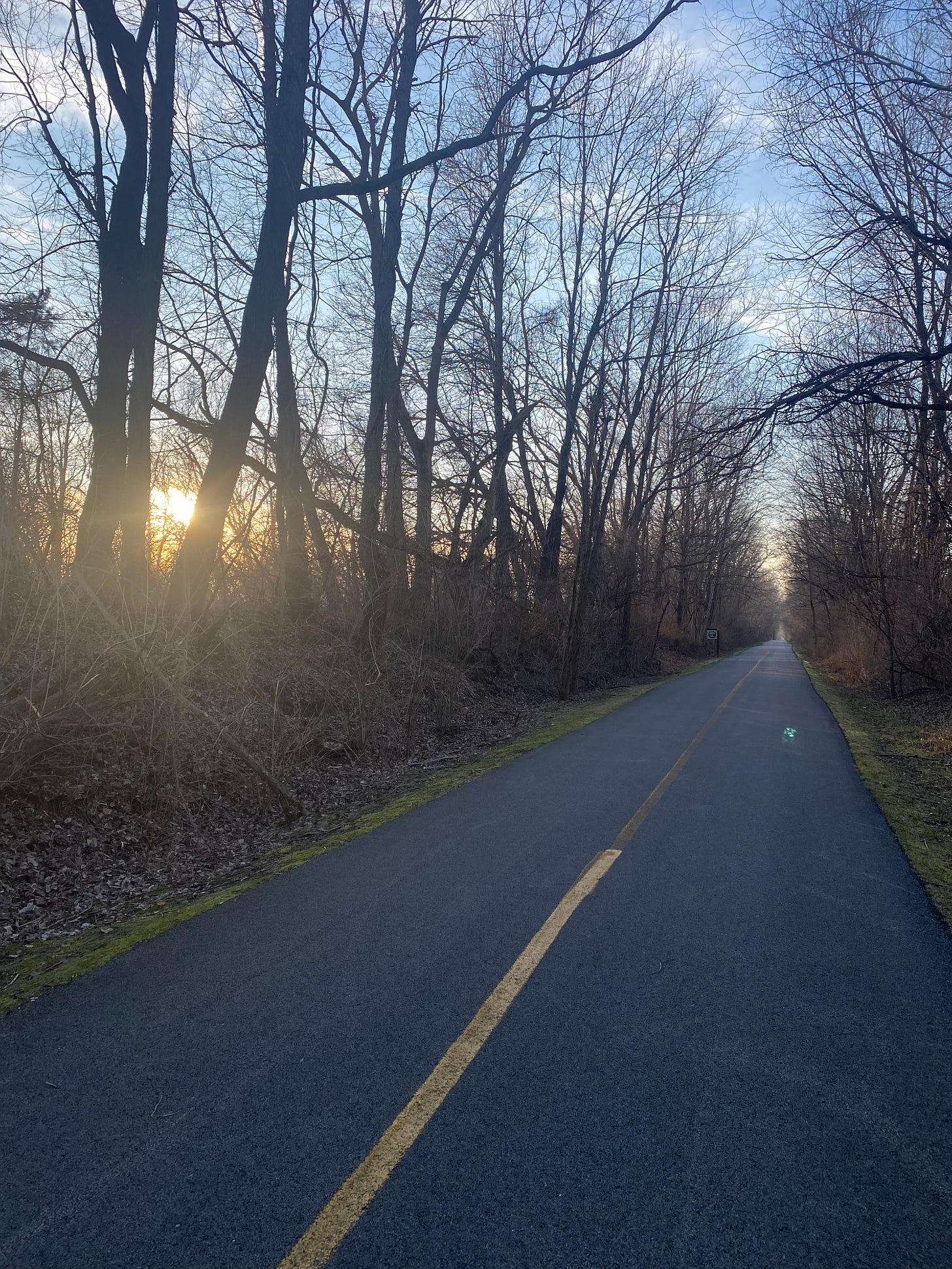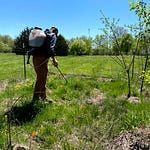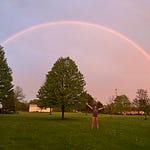Happy 2023! This is the newsletter version of Sara by the Season, where I explore a little bit of everything that’s on my mind as I try to lean into nature’s wisdom and rhythms. You can listen to me read you the newsletter by hitting play above - or you can click the little link above and to the right to play in your favorite podcast player. If you know someone who would like this sort of thing, I’d be so grateful if you would share it!
I love Katie Hawkins-Gaar’s My Sweet Dumb Brain newsletter. She writes about grief and marriage and motherhood in a very accessible, down-to-earth way. In a newsletter from a few weeks ago, she wrote about friendship after having a baby, but what stuck out to me was this post-Covid study she referenced. According to the study, we experienced significant personality changes “equivalent to about one decade of normative personality change [emphasis mine].”
Holy moly! We experienced the equivalent of a DECADE worth of personality change in the last few years. That is bonkers to me, if not all that surprising based on my own personal experience.
Science says that we get more introverted as we get older. Psychologists call it “intrinsic maturation,” and Susan Cain, author of Quiet: The Power of Introverts in a World That Can't Stop Talking, describes this process as people growing more “emotionally stable, agreeable, and conscientious…as if personalities are a kind of fine wine that mellows with age,” and she references studies that show that this phenomenon happens across cultures.
I know for me that the energy output that parenting requires has made me far more introverted and more in need of quiet time to refill my reserves than I was before kids. So some of this growing introversion and “mellowing out” is natural, it seems. But I’ve still been left feeling weird since Covid, if I’m being honest. We used to host practically weekly dinner parties and big seasonal celebrations, and now I can barely muster the energy to commit to a dinner out with friends where I have little to do except for show up. I find myself nostalgic for quarantine when we had no reason to leave the house. If I was also sad or uninterested or experiencing other symptoms of depression, this feeling might be concerning, but that study made me realize that perhaps we’ve just experienced a decade’s worth of mellowing in a much shorter length of time, making it feel less gradual and, therefore, more abrupt (in addition to just being exhausted from the constant barrage of crap coming at us from all angles).
Hopefully, as we grow older, we settle into our personalities, and science demonstrates that this is typically the case. We become more of ourselves. We tend to get happier by all metrics as we grow older.
In Katie’s newsletter, she talks about how her life has become smaller since the pandemic and having a baby, but it made me think that this tendency that we have to beat ourselves up about our supposedly small and quiet lives is just another symptom of the epic life mentality we’re infected with.
Neurology tells us that our brains are wired for novelty. We get a rush of dopamine when we experience something new and exciting. This benefited us evolutionarily because this trait enabled us to seek out and adapt to new environments. But neurology also tells us that people with too much of this novelty-seeking behavior often veer into addiction; their constant need for the novel becomes an obsession that obliterates all real enjoyment. Social media obviously supercharges this neurological tendency because it produces a dopamine hit all on its own, but it also keeps us constantly unsatisfied with our novelty in comparison to others’.
So we obviously need some novelty but not too much. We have to find our goldilocks novelty spot. Or perhaps instead of constantly seeking new and novel experiences, we need to cultivate ways to see the new and novel in our everyday lives. After all, we supposedly have somewhere in the neighborhood of 6000 thoughts a day; certainly, we can seek out some novelty in those 6000 thoughts even if our days might look similar from the outside. Perhaps this is what all of our wisdom traditions are trying to teach us when they talk about contentment and the beauty of the present moment.
It makes me think of the Buddha’s saying: “When you realize how perfect everything is you will tilt your head back and laugh at the sky.” Or Thoreau who said that you must “find your eternity in each moment.” Or Jesus who said, “Therefore do not be anxious about tomorrow, for tomorrow will be anxious for itself. ” Or the more indigenous way of thinking that would have us see the miracle - and novelty! - that is in every flower bloom or compost heap.
What Katie’s writing helped me see about the changes that I’ve seen in myself is that perhaps these changes I’ve been experiencing aren’t anything to worry about. Covid was an accelerant of plenty of things, our personalities, seemingly, being one of them. Instead of adding this to our list of things to worry about, perhaps we could see our mellowing as a gift. We could practice finding the novel in the everyday moments of our lives, finding more contentment, ease, and gratitude along the way.
Scattering Seeds
I’m always finding stuff that supports the thesis of the book I’m writing on the benefits of leaning into nature’s wisdom, so I thought I could start sharing those links and things here with all of you in hopes of some of the seeds I share germinating into something beautiful at your place.
The NYT talking about how - and why - to experience more awe in the everyday.
The ceremony of everyday life. Think about how different things would be if we thought of certain parts of our days as ceremonies. Casper ter Kuile, in the excellent The Power of Ritual, says that ritual requires three things: repetition, attention, and intention. Ritual and ceremony seem to share many characteristics, and I wonder what kind of goodness could come from bringing more attention and intention to the things we’re already doing each day.
The only kind of new year’s resolution I can get behind - and that just so happens to couple perfectly with this week’s newsletter!
Your annual reminder that January is a terrible time to be doing all of the things (unless you really want to!). January 1st as the new year is a very recent phenomenon in the grand scheme of things.
Cheers to embracing everyday novelty in the year ahead,
Sara















Share this post